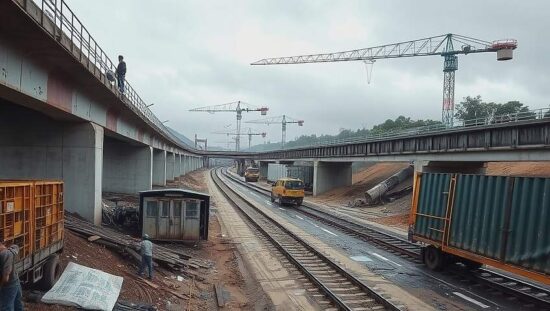A coalition of leading German transportation and infrastructure companies and associations is urgently calling for significant reforms to the implementation of the Special Assets Investment Fund for Infrastructure and Climate Neutrality (SVIK). The current framework, they argue, is severely hindering the pace of crucial investments needed to modernize Germany’s infrastructure and achieve climate neutrality.
The concerns, outlined in a strategy paper from the German Transport Forum (DVF), a body representing nearly 170 German and European companies, center around the inefficient utilization of the fund’s potential. The paper, titled “Infrastructure Pact for Germany: Strengthening Future Investments, Reforming Financing Structures, Accelerating Processes” highlights that private capital is not being leveraged effectively and collaborative approaches are lacking. The DVF, whose membership includes high-ranking executives from Fraport, Alstom, ADAC, Kühne & Nagel, Mercedes-Benz, the German Automotive Industry Association (VDA) and the Federation of German Industries (BDI), insists that the government must create a long-term, sustainable financing foundation, mirroring successful models in countries such as Switzerland, Austria, Denmark and the Netherlands.
The call for reform isn’t merely about boosting investment volume, estimated at a staggering €250 billion between 2025 and 2030. It is also a critique of Germany’s bureaucratic processes. The DVF argues that current practices are needlessly slow, impacting the ability to swiftly allocate and utilize funds. According to DVF Co-Director Florian Eck, “only one-third of every billion euros earmarked from the Special Assets Investment Fund and defense budget actually reaches the transport sector as additional funding”. This inefficiency demands that investment commitments extend beyond annual cycles, securing funding for at least a decade.
Beyond routine upgrades, the DVF is pushing for a shift towards anticipating future security needs. This includes prioritizing the development of parallel transportation routes to accommodate potential alliance or defense scenarios and ensuring the resilience of critical infrastructure through the construction and renovation of bridges, roads, rails and locks.
The forum emphasized the necessity of reforming infrastructure financing across all modes of transport. While conceptual frameworks exist, the DVF insists on their urgent implementation, demanding the development of clear target images, infrastructure plans and secured long-term funding streams. Furthermore, they want to improve the investment climate to encourage private sector involvement by accelerating project implementation, reducing lifecycle costs and nurturing partnerships that leverage private sector expertise in planning, construction and operation.
The need for streamlined procurement and award processes is another key demand. The DVF advocates for standardization and digitalization of procedures, bundling of projects and empowering administrative bodies with the ability to manage multiple projects simultaneously. Ultimately, the coalition believes a decisive “Infrastructure Pact for Germany” requiring collaboration between government, industry and civil society, is essential to address the mounting challenges and ensure Germany’s infrastructure is fit for the 21st century. This sentiment echoes concerns voiced by economic advisors last week, who also criticized the government’s management of the additional billion-euro fund.





